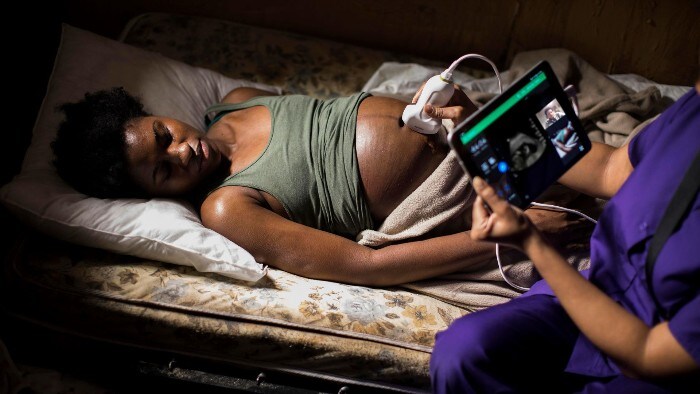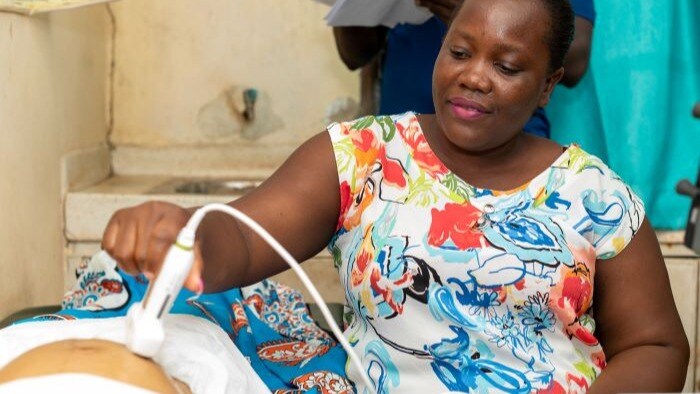Philips Backs World Health Day 2025 with AI-enabled Innovations for Maternal and Newborn Health
เม.ย. 10, 2568 - Reading time 2-4 minutes
KOREA – World Health Day, celebrated on April 7, 2025, will kick off a year-long campaign on maternal and newborn health. The campaign, titled Healthy Beginnings, Hopeful Futures, will urge governments and the health community to ramp up efforts to end preventable maternal and newborn deaths, and to prioritize women’s longer-term health and well-being.
Philips supports World Health Day, reaffirming its commitment to maternal and infant health through AI-enabled solutions that enhance early diagnosis, personalized care, and remote monitoring. By expanding access to quality care, Philips is helping create healthier futures for mothers and babies worldwide.

AI-enabled innovations have the potential to revolutionize access to the right care
In 2023, Royal Philips (NYSE: PHG, AEX: PHIA), a global leader in health technology, received a second round of funding from the Gates Foundation to accelerate the expansion of a new AI-enabled obstetric application suite using the Philips Lumify Handheld Ultrasound device. AI can support frontline health professionals in detecting key antenatal parameters used to identify higher-risk pregnancies and enabling them to recommend the right care pathway.
Once available, the Philips-AI-enabled solution is designed to support midwives and nurses in acquiring maternal and fetal parameters. The current prototype identifies key parameters, such as gestational age and amniotic fluid pocket size, which help in the assessment of the pregnancy and the health of both mom and baby.

Results from pilot testing in Kenya since the Gates Foundation provided its first phase of grant funding in 2021 have shown a positive impact, with the technology helping to drive better-informed decision-making when prioritizing care for pregnant women in rural, underserved communities.
Each day, nearly 800 women around the world die from preventable causes related to pregnancy and childbirth , with nearly 95% of all maternal deaths occurring in low- and lower-middle-income countries in 2020. Care provided by skilled health professionals before, during, and after childbirth can help save the lives of women and newborns worldwide [1].
At Philips, we are committed to delivering meaningful innovation and increasing access to care particularly in underserved areas. We are building partnerships that unite resources, expertise, and vision to address key issues and drive meaningful changes. This year, we are supporting World Health Day 2025 to help prevent women from dying in childbirth – an issue that is critical in Thailand and developing countries.
Viroj Vithayaveroj
Chairman and Managing Director, Philips Thailand
Prototype results show a positive impact
During a trial period in Kenya, feedback on the AI-enabled prototype tool has shown a positive impact. Thanks to digitalization, informatics, and AI, the interpretation of the images will not be required by the healthcare professional. Weeks of training for midwives can be reduced to hours, without negatively affecting confidence in triage. Expectant moms also find it comforting to know how their baby is progressing. Depending on the results, patients can be referred to a credentialed sonographer for image review and further investigation if needed.
“One life lost is one too many,” said Dr. Beatrice Murage, Global Director, Sustainability and Access to Care at Philips, during a recent interview with TIME Magazine for a special series on the future of health. New portable AI-enabled monitoring devices have the potential to revolutionize access to ultrasound imaging, helping to bridge the maternal healthcare gap in Kenya. Both Dr. Murage and Dr. Nidhi Leekha, a radiologist at Aga Khan University in Kenya – a critical clinical partner of Philips – are playing vital roles in expanding its reach to women everywhere.
New AI-guided algorithms assist in confidence building
The World Health Organization recommends at least one ultrasound scan before 24 weeks of gestation for pregnant women to evaluate gestational age and improve detection of fetal abnormalities with greater confidence [2].
With the automated AI capabilities built to interpret imaging data acquired from the Philips Lumify ultrasound, healthcare professionals will be provided the information to allow them to identify higher-risk pregnancies to inform their referral decisions. Ultimately, helping increase confidence and comfort of the mother in any decisions or care pathways she decides to pursue.
Ultrasound is a key tool for pregnancy screening, but proper training is essential for accurate image interpretation. In addition to global efforts, Philips is supporting frontline healthcare professionals in the Asia-Pacific region to detect pregnancy risks early, aiming to reduce maternal mortality. By bringing this innovation to the market, we strive to improve access to quality maternal care in underserved and rural communities across the region.
Denilson Hiraki Kuratomi
Ultrasound Business Leader, Philips APAC
Philips’ leadership in Ultrasound worldwide
References [1] https://www.who.int/news-room/fact-sheets/detail/maternal-mortality
Philips Ultrasound systems installed around the world perform an estimated 1.33 billion diagnostic and interventional procedures each year. With this latest AI-enabled prototype, Philips continues its commitment to deliver industry-first innovations in areas such as 3D imaging of the heart, AI-powered quantification tools, and ultra-mobile portable ultrasound solutions. Visit Philips Ultrasound for more information on the latest innovations in cardiology, general imaging and point-of-care OB/GYN ultrasound solutions.








